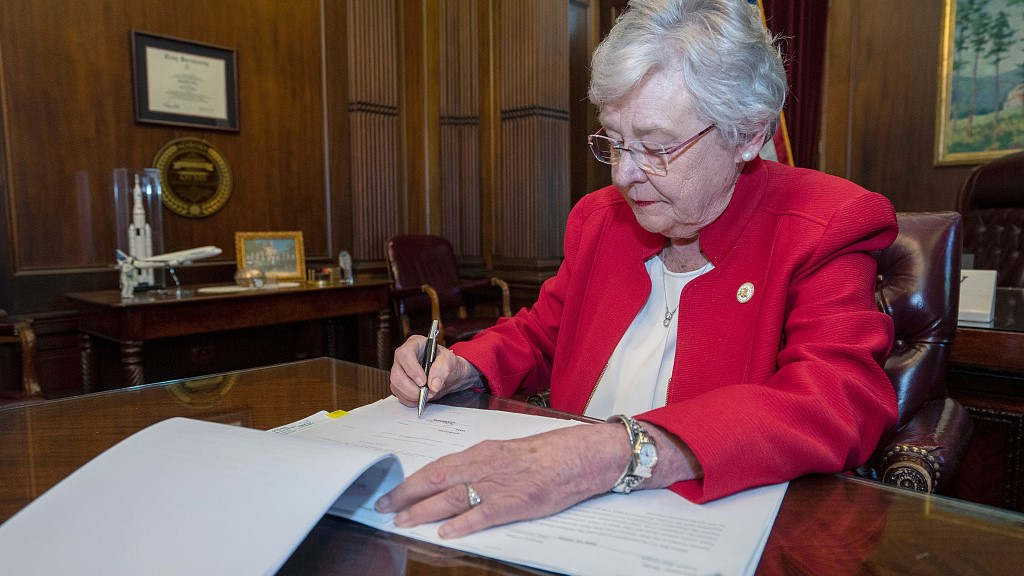Some 2.5 million women in Alabama experienced a historic day on Thursday, May 15, 2019, as Republican governor Kay Ivey signed an abortion bill passed by the Republican-controlled Alabama state legislature a day earlier, stating abortion is banned in Alabama even under the circumstances of incest and rape.
The bill makes Alabama the most restrictive state on abortion and has thrown the Supreme Court in a swirling, in which the justices need to consider whether they need to overturn the landmark Roe vs. Wade ruling. The ruling admitted that the Due Process Clause of the Fourteenth Amendment to the U.S. Constitution provides a fundamental "right to privacy" that protects a pregnant woman's liberty to choose whether or not to have an abortion.
Wednesday's bill prompted a national debate in the U.S. on issues including women's liberty on abortion, religious and political role in the pass of the bill, and how women's voice was unheard in the voting, etc.
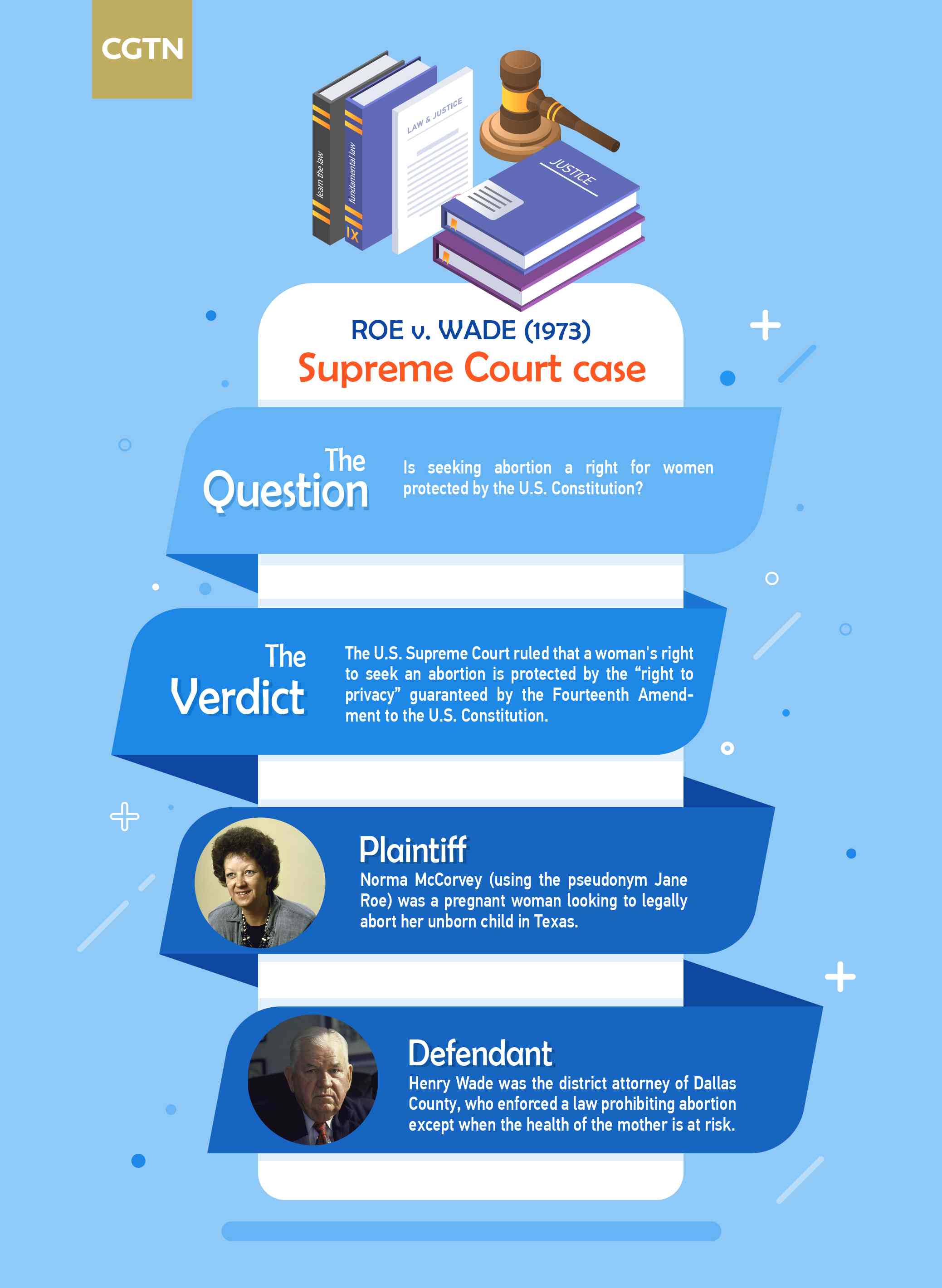
The landmark Roe vs. Wade ruling admitted women's liberty to choose whether or not to have an abortion. /CGTN Photo
The landmark Roe vs. Wade ruling admitted women's liberty to choose whether or not to have an abortion. /CGTN Photo
25 white men vs. 3 women in Alabama legislature
On Tuesday's debate, state senator Linda Coleman-Madison was one of the only three women to vote against the bill, HB314, while 25 votes cast in favor of the bill were all from white Republican men, which makes the voting a sharp focus.
Madison asked what exactly did that mean when Clyde Chambliss, one of the bill's steadfast Republican backers, explained earlier that the law wouldn't affect women until they "are known" to be pregnant.
Chambliss replied to her: "Well, if you don't know, then you're not known to be pregnant," which in Coleman-Madison's eyes is a "typical male answer."
"You don't know what you don't know because you've never been pregnant. And herein is the problem: You can't get pregnant... You don't know what it's like to be pregnant," she told the Washington Post.
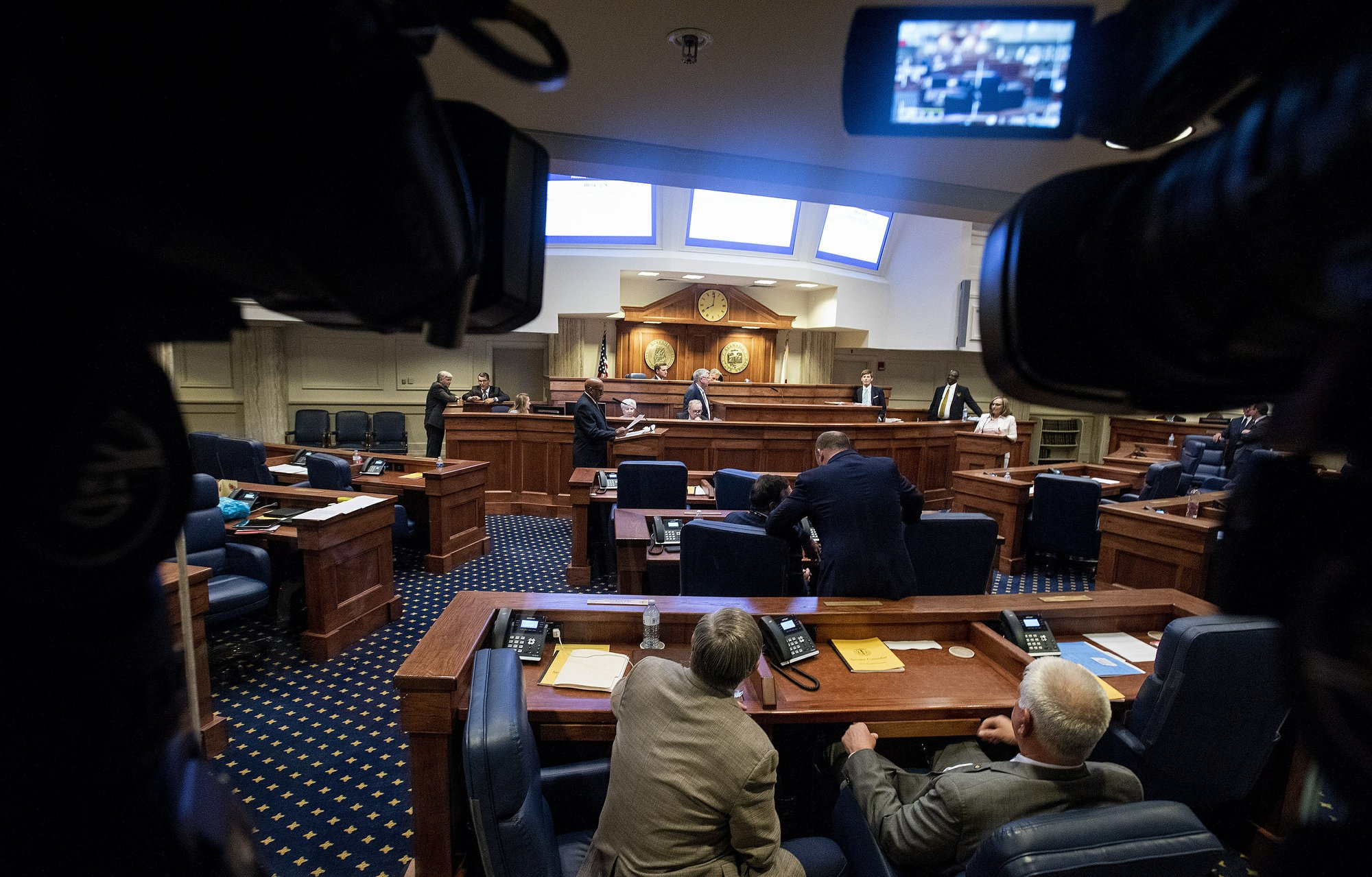
Lawmakers debate a ban on nearly all abortions in the senate chamber in the Alabama State House in Montgomery, Alamaba, May 14, 2019. /AP Photo
Lawmakers debate a ban on nearly all abortions in the senate chamber in the Alabama State House in Montgomery, Alamaba, May 14, 2019. /AP Photo
When women make up a lower percentage of elected office-holders, they are stripped of the right to voice their thoughts on crucial legislative actions. According to U.S. Census projections for 2019, Alabama's population is estimated to be 4.90 million, with gender percentages currently at 51.5 percent female and 48.5 percent male.
However, the over half the percentage of women in Alabama only make up 15 percent of the legislature, lower than the national level which stands at 20 percent, according to the National Conference of State Legislatures of the United States.
"The vast spectrum of women's intersectional identities are being overlooked in legislative settings. Instead of speaking our truth, women are commonly silenced and spoken for by our male counterparts," said Brooke E. López, the founder and executive director of Lone Star Parity Project, a nonpartisan, online publication dedicated to sharing the stories of women in Texas politics.
The lack of women's voices in politics
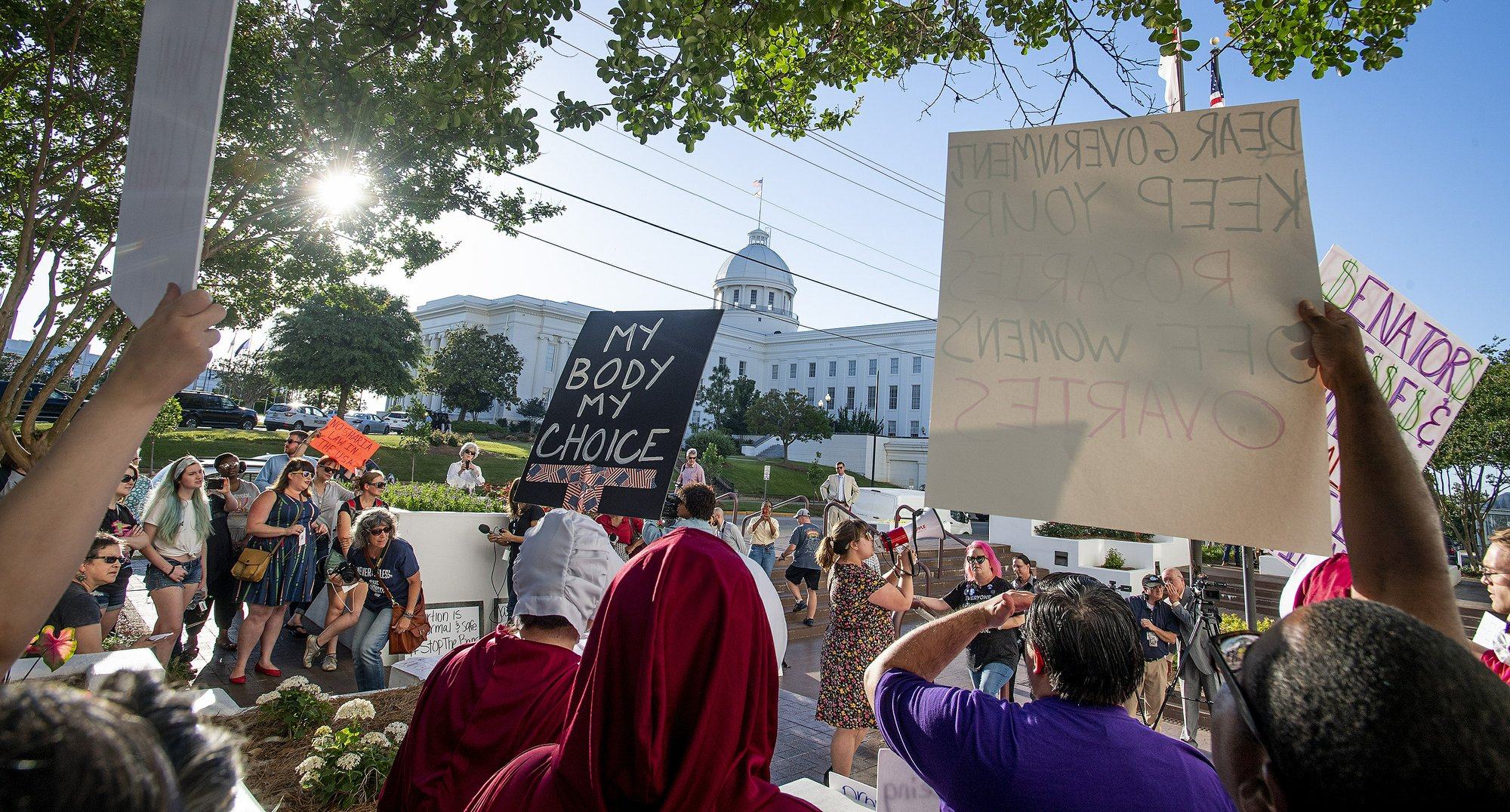
Lucia Hermo holds the megaphone and leads the crowd with chants during a rally against HB314, the near-total ban on the abortion bill, outside of the Alabama State House in Montgomery, Alabama, May 14, 2019. /AP Photo
Lucia Hermo holds the megaphone and leads the crowd with chants during a rally against HB314, the near-total ban on the abortion bill, outside of the Alabama State House in Montgomery, Alabama, May 14, 2019. /AP Photo
In a poll conducted by the Pew Research Center last year, 58 percent of those surveyed argued abortion should be legal in all or most cases while 37 percent said it should be illegal, which means near-total abortion ban is not OK for nearly 60 percent people, especially for women in the United States.
The ban reflects the distrust of men who don't see women as rational citizens, as independent groups who know what's the best for themselves, their family and the society.
Women of the U.S. gained their right to vote in 1920 through decades of agitation, marching, lobbying and protesting. The Declaration of Independence may have proclaimed that "all men are created equal," but few women believed Jefferson's rhetoric applied to them at the time. Now, it's the 21st century, women's voices are still weakened by the male-dominated political world, even on the issue of abortion, which is tightly related to women's health and life.
"This is a really sad day for women in Alabama and all across the nation," Dr. Yashica Robinson told the Associated Press. "It's like we have just taken three steps backwards as far as women's rights and being able to make decisions that are best for them and best for their families."
Why women seek an abortion?
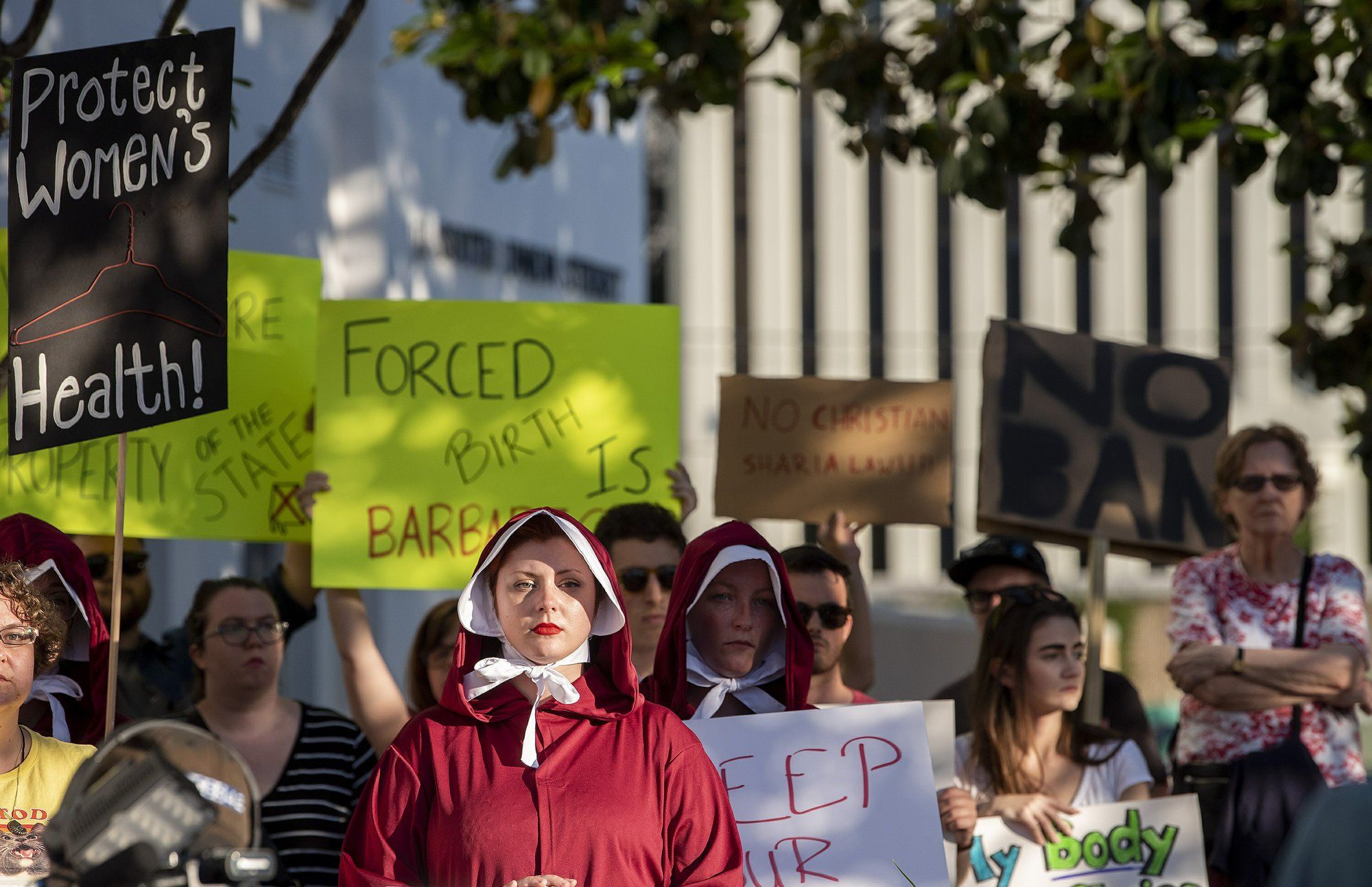
Margeaux Hartline, dressed as a handmaid, protests against a ban on nearly all abortions outside of the Alabama State House in Montgomery, Alabama, May 14, 2019. /AP Photo
Margeaux Hartline, dressed as a handmaid, protests against a ban on nearly all abortions outside of the Alabama State House in Montgomery, Alabama, May 14, 2019. /AP Photo
Following Alabama's vote for a near-total ban on abortion, women began to share their abortion stories online with the hashtag #youknowme, which was initiated by actress and talk show host Busy Philipps, who asked women to share their abortion stories in their twitter posts in a move to respond to the Alabama abortion ban.
"One in four women have had an abortion. Many people think they don't know someone who has, but #youknowme," Philipps tweeted to her 367,000 followers, and the twitter has been liked more than 15,000 times since being posted early on Wednesday.
Women who shared their stories have either suffered from rape, brain death of their beloved unformed baby or have a heavy mortgage payment and encounter ignorant youth pregnancy, etc. Some said the ban can only make things worse and more dangerous for women who want to have an abortion. They will try everything to hurt themselves to abort, including throwing themselves down the stair.
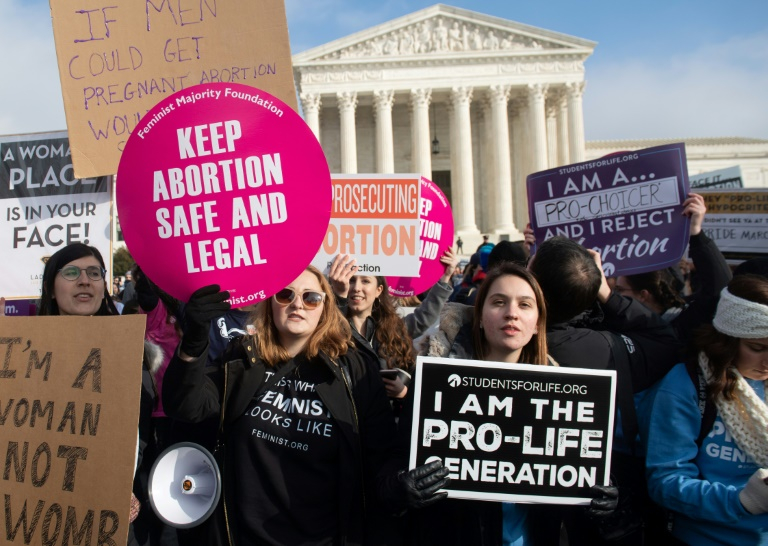
Abortion rights supporters and opponents mark the anniversary of the decision in Roe vs. Wade, the 1973 Supreme Court case that legalized abortion in the United States. /AFP Photo
Abortion rights supporters and opponents mark the anniversary of the decision in Roe vs. Wade, the 1973 Supreme Court case that legalized abortion in the United States. /AFP Photo
Having a baby can be life-changing for many women, and when they seek an abortion, they always struggle to make the decision.
According to a survey conducted by Guttmacher Institute, which examined nationally representative data from 14 countries collected in official statistics, the reason for 40 percent of women seeking abortion was they are not financially prepared. Thirty-six percent of the women believed it was not the right time for a baby, and 12 percent of the women want to provide a better life for their baby than she could. The consideration out of maternal or fetal health risk to have an abortion also makes up 12 percent.
Coleman-Madison believes the pass of Alabama abortion ban is all about strength in numbers. And men decided the fate of women, whenever their voices are louder than women's in the political sphere.
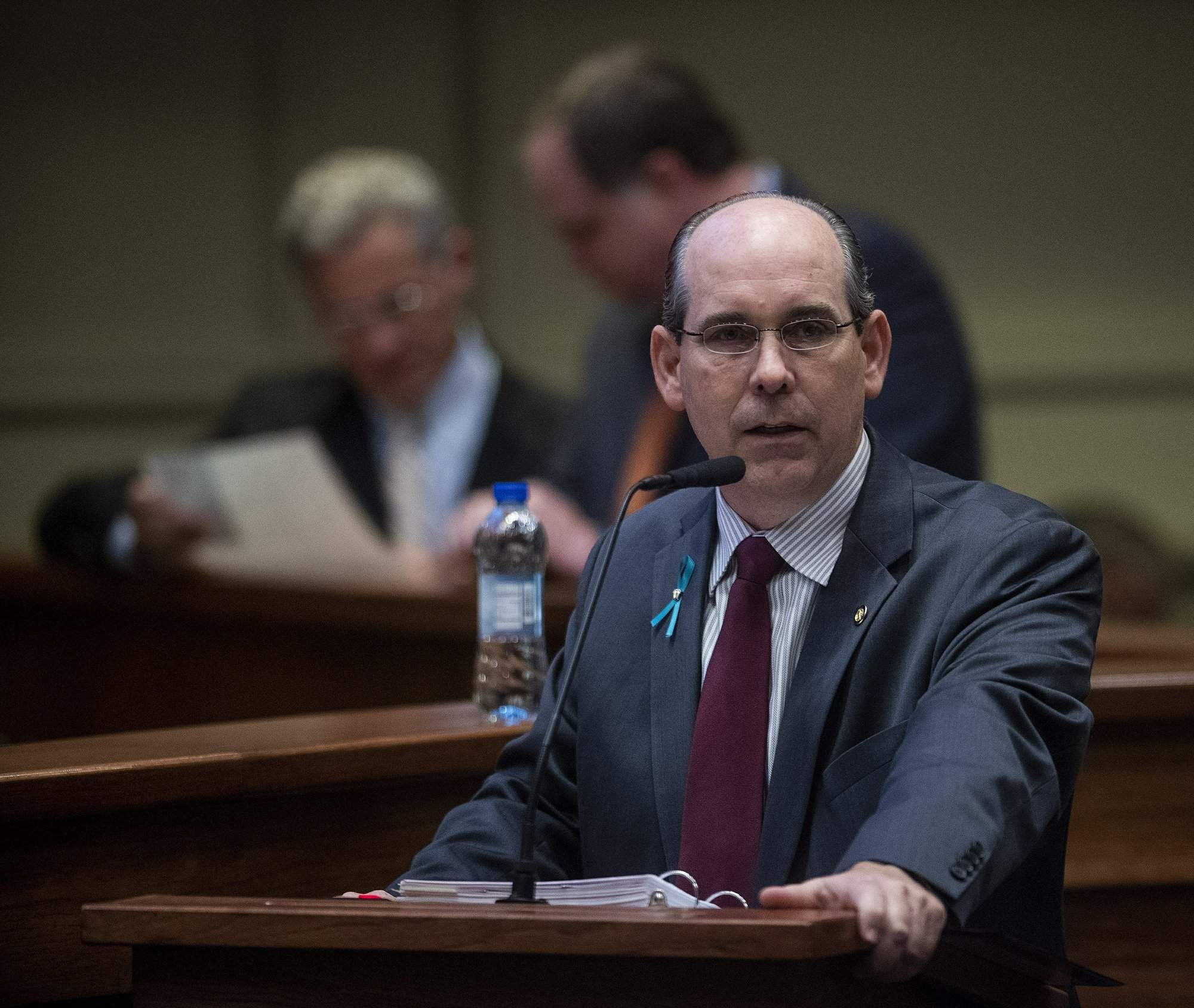
Senator Clyde Chambliss speaks as the debate on HB314, a near-total ban on the abortion bill is held in the Senate chamber in the Alabama Statehouse in Montgomery, Alabama, May 14, 2019. /AP Photo
Senator Clyde Chambliss speaks as the debate on HB314, a near-total ban on the abortion bill is held in the Senate chamber in the Alabama Statehouse in Montgomery, Alabama, May 14, 2019. /AP Photo
"That's why we need more women to run for office. These decisions are going to be made whether we like it or not, and more likely we're not going to like it when decisions like this one, about a woman and her health, are being made by all the men," Coleman-Madison told media.
(Cover image: Alabama Gov. Kay Ivey is signing a bill that virtually outlaws abortion in the state, Montgomery, Alabama, May 15, 2019. /AP Photo)

